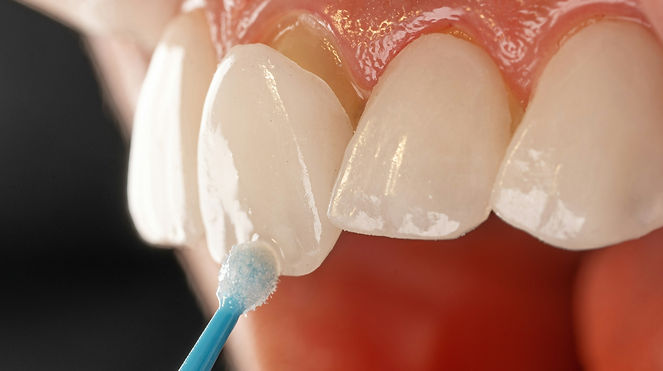Dental Veneers Quick Facts
Veneers are an elective cosmetic dental procedure. They cover the front of your teeth and slightly over the edges so when you smile you see a perfect set of teeth but, your natural tooth is still in place behind them.
Getting dental veneers can be exciting. Your dentist will work with you over multiple sessions to create a winning smile.
Cost
Can be expensive
Insurance
Not generally covered
Time
Multiple Visits Needed
Getting Veneers
At A Glance
01
Confirmation
Now that your veneers have come in from the lab. Dr Holt will ensure the veneers are a good fit and the shape and coloration is correct for your sm.ile.
02
Prepping Your Teeth
Once everything is set, Dr. Holt will prepare your teeth by cleaning them and removing a thin layer of enamel. This makes room for the veneers. He might also use a gel to roughen the surface so the veneers stick better.
03
Bonding Agent
A bonding gel or dental cement will be used to coat your teeth before applying the veneers. This bonding agent hardens and will hold your veneers in place.
04
Ultraviolet Light
Once your veneers have been placed over your natural teeth an ultraviolet light is used to 'cure' the bonding agent and cement the bond between your natural teeth and the veneers.
05
Touch Ups
Now your veneers are placed and the bonding agent cured Dr Holt will clean up any excess cement and make any final adjustments. You're then done for the initial process!
06
Follow Up
You'll come in for a follow-up with Dr Holt to confirm everything is ok, the veneers haven't moved and that you're not experiencing any discomfort.

Living With Your New Veneers
After getting veneers, it’s important to take good care of them to keep them looking great and lasting long. Use a soft-bristled toothbrush and non-abrasive toothpaste, and make sure to floss gently so you don’t harm the veneers.
Stay away from hard or sticky foods that might cause damage, and limit things like coffee or red wine that can stain your teeth. It’s normal to have some sensitivity to hot or cold at first, but if it sticks around, contact your dentist.
If you play sports or grind your teeth, wearing a mouthguard is a good idea to protect the veneers. Don’t forget to visit your dentist regularly to check up on how your veneers are doing. In the first 24 hours, avoid hard foods and be gentle with brushing.
If your gums feel irritated, rinsing with warm salt water can help. For the long haul, stick to a balanced diet and keep up with good brushing and flossing habits to keep your veneers and gums healthy.
Dental Veneer FAQs
What are veneers?
Dental veneers are thin, custom-made shells that are bonded to the front of teeth to improve their appearance. They are made from tooth-colored materials like porcelain or resin composite and are used to cover a variety of cosmetic issues such as:
-
Discolored teeth
-
Worn down teeth
-
Chipped or broken teeth
-
Misaligned, uneven or irregularly shaped teeth
-
Gaps between teeth
What are the benefits of Veneers?

Dental veneers offer a range of benefits that can dramatically improve the appearance and health of your smile. Here are some of the key advantages of getting veneers:
-
Natural-Looking Results; Veneers are custom-made to match the shade, shape and texture of your natural teeth. When properly placed by an experienced cosmetic dentist, they look completely natural and blend seamlessly with the rest of your smile.
-
Long-Lasting; With proper care, porcelain veneers can last 10-15 years on average before needing replacement. They are very strong and resistant to chipping or cracking.
-
Stain Resistance; Porcelain veneers are highly resistant to staining from coffee, tea, red wine or tobacco.
-
Improved Confidence; By correcting cosmetic flaws and giving you a beautiful, uniform smile, veneers can boost your self-esteem and confidence in social and professional situations
-
Versatility; Veneers address a wide range of aesthetic issues including discoloration, chips, cracks, gaps, and misshapen or crooked teeth.
What do veneers cost?
The cost of dental veneers varies widely based on several factors, including the type of veneer, the dentist's expertise, and geographical location.
Here are the key points regarding the pricing;
-
Type of Veneer: Porcelain veneers are generally more expensive than composite resin veneers due to their durability and aesthetic appeal.
-
Geographical Location: Prices can vary significantly by region. For example, costs in urban areas may be higher due to the higher cost of living and demand for cosmetic procedures.
-
Dentist's Expertise: The experience and specialization of the dentist can affect the price. Specialists like prosthodontists may charge more than general dentists.
-
Insurance Coverage: Most dental insurance plans do not cover veneers since they are considered a cosmetic procedure. However, if veneers are necessary for medical reasons (e.g., to repair a damaged tooth), some coverage may apply
Does getting veneers hurt?
Generally no, veneers are mostly a cosmetic procedure and while you might feel some slight discomfort during the procedure, veneers are usually quite painless.
Who will be doing it?
Your dentists for this procedure will be Dr John Holt Sr and Dr John Holt Junior. A family legacy of great dentistry and hundreds of patients served you are in very good hands for your veneers.


